 Petzlover
Petzlover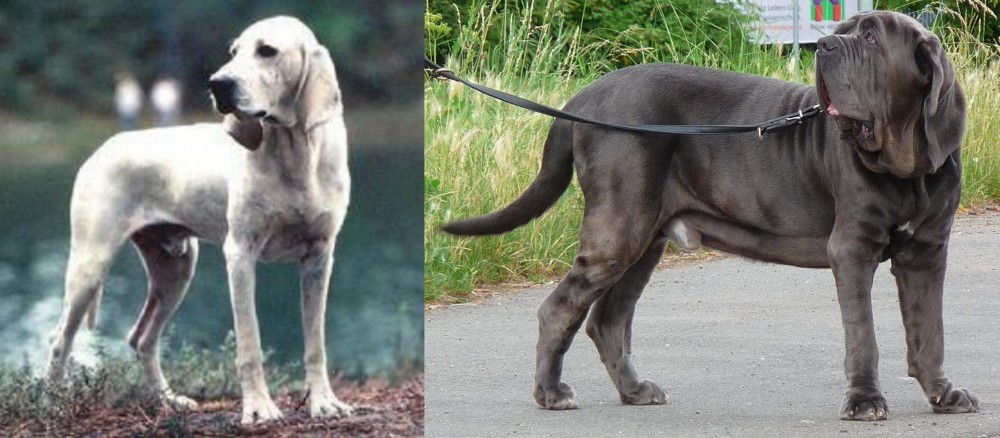 Porcelaine is originated from France but Neapolitan Mastiff is originated from Italy. Porcelaine may grow 12 cm / 4 inches shorter than Neapolitan Mastiff. Porcelaine may weigh 51 kg / 112 pounds lesser than Neapolitan Mastiff. Porcelaine may live 5 years more than Neapolitan Mastiff. Porcelaine may have less litter size than Neapolitan Mastiff. Porcelaine requires Low Maintenance. But Neapolitan Mastiff requires Moderate Maintenance
Porcelaine is originated from France but Neapolitan Mastiff is originated from Italy. Porcelaine may grow 12 cm / 4 inches shorter than Neapolitan Mastiff. Porcelaine may weigh 51 kg / 112 pounds lesser than Neapolitan Mastiff. Porcelaine may live 5 years more than Neapolitan Mastiff. Porcelaine may have less litter size than Neapolitan Mastiff. Porcelaine requires Low Maintenance. But Neapolitan Mastiff requires Moderate Maintenance
 The Porcelaine is an attractive dog hailing from France. It is thought to be the oldest of the French scent hounds.
The Porcelaine is an attractive dog hailing from France. It is thought to be the oldest of the French scent hounds.
The dog also goes by the name of Chien de Franche-Comté. The dogs were developed for hunting purposes. It is believed to be an ancient dog breed, dating way back to the 1700s.
It is thought that dogs used to bring about the Porcelain are the Talbot Hound, the English Harrier, the Montaimboeuf, as well as some smaller Laufhunds of Switzerland.
The Club du Porcelaine was established in France in 1971 and the breed was recognized by the FCI in 1975. It is a rare breed virtually unknown outside of France.
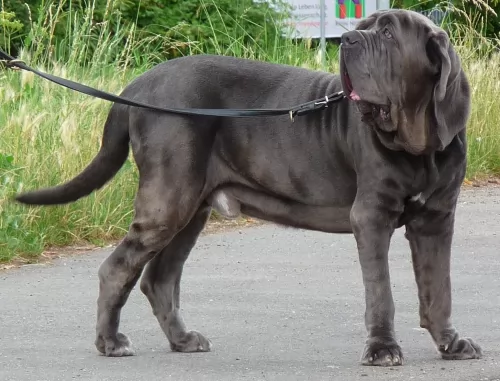 An ancient breed, the Neapolitan Mastiffs are massive dogs with a history of protecting their family and their property. The breed has deep rooted protective instincts and they are very frightening in appearance. The Neapolitan is of the Molosser group of dogs, all of whom probably came from the same line. It is known that all the mastiffs in Europe are descendants of the Tibetan Mastiff. The Tibetan Mastiff is considered the most ancient of all canines.
An ancient breed, the Neapolitan Mastiffs are massive dogs with a history of protecting their family and their property. The breed has deep rooted protective instincts and they are very frightening in appearance. The Neapolitan is of the Molosser group of dogs, all of whom probably came from the same line. It is known that all the mastiffs in Europe are descendants of the Tibetan Mastiff. The Tibetan Mastiff is considered the most ancient of all canines.
The Asian Mastiffs came from India to Greece around 300 BC with Alexander the Great. Then the breed was brought to the Romans by the Greeks and then introduced them in their circus in fights. Another possibility is that around 500 BC the mastiffs came to Britain from the Phoenicians. Either way the Roman Molossus is the ancestor of the Neapolitan Mastiff.
The Romans crossed the breed with the English Mastiff around 55 BC and developed a premiere war dog that was called a Mastini.
The breed eventually became extinct in Europe with the exception of Campania. The breed was recognized in 1946 with the standard accepted in 1949. However, it is believed that the Neapolitan Mastiff has been continuously present in Campania for over two thousand years. The breed was initially developed as war dogs and for the Roman coliseum spectacles.
In 1946 Dr. Piero Scanziani established a program to breed them in Italy. He wrote the breed standard in 1949.
Today the Neo is a farm dog, an army dog, a police dog and a guard dog. They were shown in Italy for the first time in 1946 but only in 2004 was the breed recognized by the American Kennel Club (AKC). It was 1973 when the Neapolitan Mastiff Club of America was born and 1996 when the standard was approved by the AKC. They are still a rare breed in the United States.
 The Porcelaine has got such a gentle, amicable face that he looks like he wouldn’t hurt a fly.
The Porcelaine has got such a gentle, amicable face that he looks like he wouldn’t hurt a fly.
His interesting name comes from the fact that he has a shiny, gleaming single coat that looks like white porcelain.
He has a distinguished look to him with his slender neck, slender head with longish muzzle. The body is well proportioned, lean and muscular. Another noticeable feature of this dog is the long, floppy ears which can have a hint of orange. His nose is black and he has dark eyes and a long tail. He is a medium sized dog standing at between 53 to 58cm in height and weighs about 25 to 28kg.
Elegant and beautiful, the Porcelaine isn’t your usual looking dog. He is amicable and easy-going and always ready for a pat on the silky head.
His temperament, kindly and easy going, makes him the perfect pet for therapy purposes and for search and rescue work. He is a quiet, well behaved dog, indoors and out. He is an energetic dog and loves nothing more than a hunt and he has a keen sense of smell.
He loves being outdoors but is such a good friend of yours he can happily turn into a couch potato to be by your side.
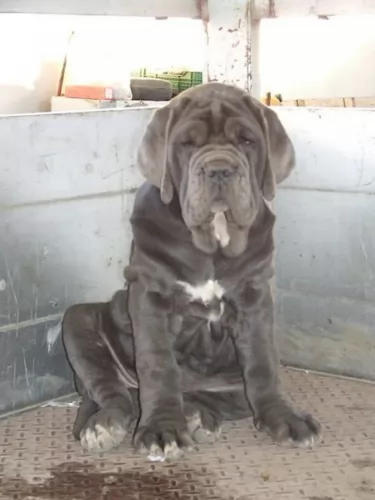 The Neapolitan Mastiff is a massive dog , so powerful and very intimidating in his looks. With an incredibly large head and hanging folds and wrinkles, the Neo is an impressive animal. His inner nobility and dignity is evident in his stance and the way he holds himself. He is relaxed, calm, quiet yet imposing none the less. His coat is dark whether black, tawny, gray or mahogany. He is muscular beyond imagination. The Neo is 10-15% longer than he is tall.
The Neapolitan Mastiff is a massive dog , so powerful and very intimidating in his looks. With an incredibly large head and hanging folds and wrinkles, the Neo is an impressive animal. His inner nobility and dignity is evident in his stance and the way he holds himself. He is relaxed, calm, quiet yet imposing none the less. His coat is dark whether black, tawny, gray or mahogany. He is muscular beyond imagination. The Neo is 10-15% longer than he is tall.
On his massive head his eyes are deep set and covered by his eye lids that droop. His eyes are blue as puppies then dark and coordinated with his coat. and his nose is large and the color of his coat. Ears are natural or can be cropped, and they carry their tail straight and curving back. The Neo has round paws and arched toes.
 The Porcelaine is a working, hunting dog but he is more than willing to become a companion animal, being loving and loyal to his human family.
The Porcelaine is a working, hunting dog but he is more than willing to become a companion animal, being loving and loyal to his human family.
He is a balanced, kind natured dog and can get on well with children and with pets in the home.
He enjoys his human family, and typical of hounds he is friendly, energetic and amusing. Bring this beautiful white dog into your home and start a wonderful, long, loving friendship with him.
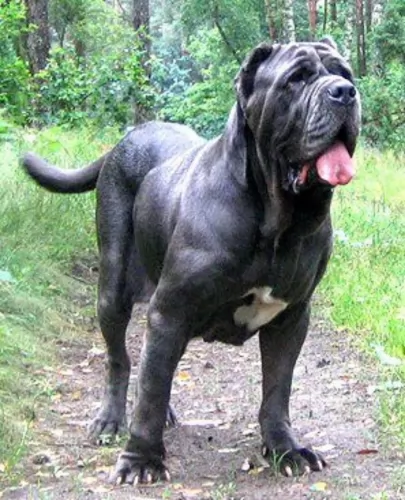 Older children in their family. No toddlers or strangers.
Older children in their family. No toddlers or strangers.
Protective yet quiet, calm, relaxed
No they won’t adapt well to apartment living or to strangers.
They are intelligent and trainable but must be socialized and know the human is the alpha or they will take over.
 The Porcelaine has so many good features, and good health is one. He is described as a truly healthy breed that can easily reach up to 14 years of age with good care.
The Porcelaine has so many good features, and good health is one. He is described as a truly healthy breed that can easily reach up to 14 years of age with good care.
As a Porcelaine owner, look out for some of the more common heath conditions such as cancer, bloat and skin infections.
A working, hunting type dog such as the Porcelaine can be devastated with hip dysplasia. It’s a disease that can be genetically passed on and if your dog has it,it should be spayed or neutered. The condition, where your pet becomes more and more reluctant to participate in exercise can be painful and debilitating.
There are different treatments available for pain relief and mobility.
The long, floppy ears of the Porcelaine can result in a tendency towards ear infections. Ear infections can be painful and frustrating and you’ll see your dog scratching his ears and shaking his head. The ears may be red inside and there may even be a discharge. Don’t allow your pet to suffer and get him to the vet.
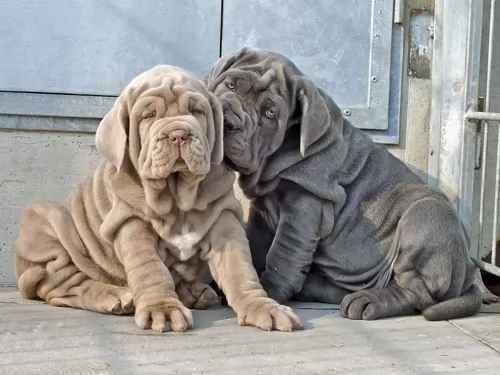 The Neapolitan Mastiff is prone to many of the same issues as any massive, extra large breed. The most common of these is Cherry Eye.
The Neapolitan Mastiff is prone to many of the same issues as any massive, extra large breed. The most common of these is Cherry Eye.
 Porcelaines have a very high activity level and require lots of exercise - ball games and walks. Because of this, they aren't recommended for people living in small homes in the city. He will ideally suit life on a big property.
Porcelaines have a very high activity level and require lots of exercise - ball games and walks. Because of this, they aren't recommended for people living in small homes in the city. He will ideally suit life on a big property.
The Porcelaine Dog is a single coated dog with very short hair and is looked upon as being pretty low maintenance.
Apart from brushing him twice a week, to keep the coat shiny and healthy, wipe him down with a hound mitt to get rid of loose hairs and to remove dust.
Because of the long, floppy ears, clean the insides very gently to avoid dirt, moisture and wax buildup. There are veterinarian-recommended ear cleansers, but if you don’t like the idea of doing it yourself, the vet or groomer will do it for you when you take him to have his nails clipped.
Your beautiful Porcelaine dog needs the very best food there is so as to ensure he remains the healthy, shiny, lean specimen he is.
He can live a long, healthy life if you choose quality dog food packed with the right mix of vitamins and minerals. If you buy commercially manufactured dog food for him, it needs to be the high quality ones to ensure its properly formulated.
Your Porcelaine, like any other dog, wants consistency and simplicity. Home-made food is always an excellent choice for your pet’s diet. Boiled chicken, brown rice or pasta and spinach, sweet potatoes and carrots can be very healthy for him.
Chop it up and add it into the dry kibble a couple of times a week. Its providing him with some variety from the dry kibble and gives him a tasty treat.
Some raw meat added in occasionally will also ensure his coat and eyes remain bright and vibrant. Always make sure he has access to fresh, cool water.
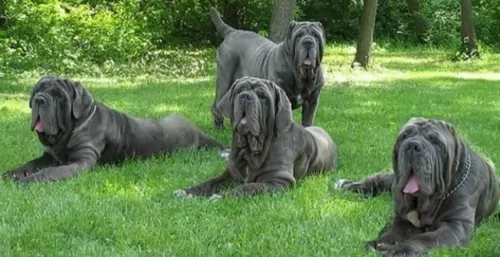 Neapolitans grow fast and so don’t overfeed when they are young. Lower protein and higher fat content.
Neapolitans grow fast and so don’t overfeed when they are young. Lower protein and higher fat content.
Don’t overfeed the adult as they can become obese.
This big hearty breed needs exercise but not too much. They overheat easily. The puppy will push himself, so you have to make sure he doesn’t over do it. No tug of war games. They need a long walk twice every day.